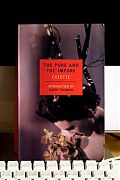
Colette
The Pure and the Impure
Two photographs of Colette drew me by their initial incongruities. One: in her dancehall theatre days she sits crosslegged, confident: no one dare trespass a woman in an armored bra. Two: Colette wears a pleated shirt front, hard collar, a waistcoat and always a silk pocket handkerchief. The second also appears as playacting, not as an Egyptian princess but as a man. I like both photographs equally. They also best illustrate what The Pure and the Impure might be trying to subtly say.
In the first sentence of Judith Thurman’s introduction, she defines The Pure and the Impure as an investigation into the nature and laws of the erotic life. And so I have fantasies near to Anaïs Nin’s Delta of Venus but this “nature” and these “laws” are not so sensually revealed. In Colette’s erotic one must be prepared to slowly intake each chapter’s conversation, where it fits or defies nature and laws.
The Pure and the Impure is short, written in first person. In each of the nine chapters Colette introduces us to another “ghost.” A woman gives selfless pleasure to a younger man, echoing the low-throat calls of a contrived orgasm through silent yet populated halls. A couple Don Juans. Lesbians and gay men. Each ghost gives another impression (or depression) of “the sense.”
In that word Inexorable, I gather together the sheaf of powers to which we have been unable to give a better name than “the senses.” The senses? Why not the sense?
And the ghosts?
…restless ghosts unrecovered from wounds sustained in the past when they crashed headlong or sidelong against that barrier reef, mysterious and incomprehensible, the human body.
When I try to unwind the connection between the “stories” I become stuck. Again I turn to the Introduction:
The Pure and the Impure tracks the course of the forbidden desires which go underground, to resurface as perversions, and the search of a fragmented self for another, symmetrically fragmented to complete it.
Desires gone underground belong mostly to women, and gay men and to men whose lifelong occupation has been to seduce as many women into their beds as possible. The conclusions, what has been done with desire, how it has been manifested varies, for each person must deal with their inexorable on their own.
A touching tale Colette briefly retells is of two women in love who lived in exile so they could be together. Lady Eleanor and Sarah Ponsonby ran away together in 1778 to cloister their solitude, their reciprocal tenderness for fifty-three years in a small village in Wales. Colette writes effulgent of what these two women did against all the morals of what they should have done. She herself believes it too good to be true.
A day of the most perfect and sweet retirement, quotes the journal of Lady Eleanor. My beloved and I went a delicious walk. But how far did their desires go? Sarah left no written record, she was not even referred to in the journal by name: the underground has no place in the content perfection Eleanor’s journal weaves. Instability and shaky uncertainty had to be there, Colette believed.
The longest conversation is with Renée Vivien, the tragic love poet who died at thirty. Colette and her were neighbors by the back gate which opened on the most tenuous of friendships.
Renée’s apartment was dark and shadowy, with incense burning like a funeral parlor and the windows nailed down. Renée’s demeanor was cheerful. What was the origin of such dark tragedy? What was the sadness so eagerly expressed? She was involved with a rich and well-known woman. Her poetry often overflowed with love. She drank and stopped eating until she withered away: underground until you’re gone.
Voluptuaries, consumed by their senses, always begin by flinging themselves with a great display of frenzy into an abyss. But they survive, they come to the surface again. And they develop a routine of the abyss: “It’s four o’clock… At five I have my abyss…”
The Pure and the Impure felt fragmented, which was perhaps Colette’s intent. At times I found the narrative lacking, most likely because it is about sex more-or-less. Perhaps, and unbeknownst to me, I believe a book about sex and desire should blow my body away or titillate it or anything besides working the mind. But this was not Colette’s point. The Pure and the Impure will do, but next time I’ll take her fiction.
· · · · · · · · · · · · · · · · · · · ·